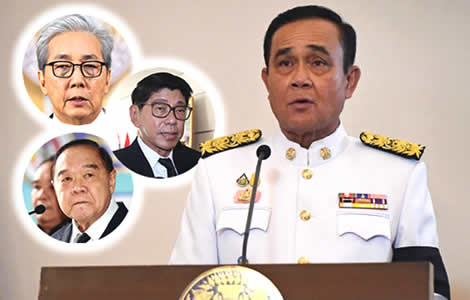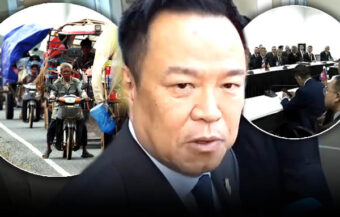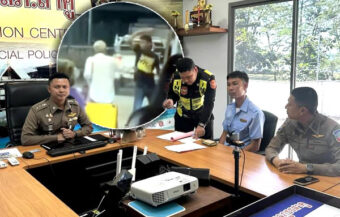Legal expert and government insider Wissanu Krea-ngam this week refused to comment on how long the new government would last but compared it to an iron ship. With the finalisation of a government policy statement underway and the cabinet soon to be sworn in, July should see the official end of the National Council for Peace and Order or junta and with it, its extraordinary powers leaving the PM to captain his ship in turbulent democratic waters.
The new Thai government will set sail in July as the Thai prime minister confirmed on Tuesday that the final cabinet lineup has been decided upon. Bringing an end to the infighting and squabbling within the Palang Pracharat Party with an abrupt ultimatum this week, the prime minister at the same time dismissed it as just a transitional crisis. The new cabinet lineup will contain many of the old stalwarts who have served General Prayut well, chief among them, the deputy prime ministers Prawit Wongsuwan, Somkid Jatusripita and Wissanu Krea-ngam.

Thai Prime Minister Prayut Chan-ocha announced on Tuesday that the cabinet lineup for the new government has already been finalised and that it would be sworn in by mid-July.
The PM was speaking at a gathering of 200 children who had travelled to Thailand and Government House from the United States where the American Thai community is growing rapidly both in numbers and influence.
Prime minister asserts his authority to bring an end to unsightly political infighting
The announcement by General Prayut came just 24 hours after the climax of bitter infighting within the Palang Pracharat Party in which the influential Sam Mitr group appeared to have come out on top in that faction’s efforts to swing the position of energy minister in the new government lineup to their leader Suriya Jungrungreangkit.
There was even a statement from the other talked about front runner for the position on Monday. Palang Prachartat secretary-general Sontirat Sontijirawong, in a public statement, relinquished any further interest in the post.
Now it is reported that all has changed as the prime minister moved to assert his authority to bring an end to the bitter infighting.
Opinion polls last weekend showed public disgust at the spectacle of political squabbling
The squabbling within the Palang Pracharat Party led on Monday to an extraordinary public apology from Thailand’s newly elected government leader for the shameful discord which according to opinion polls has disappointed a large segment the Thai electorate.
In his Monday statement, the Prime Minister also alluded to the possibility of a coup or as he put it, ‘old solutions’ to intractable political deadlock in Thailand when it breaks out.
The Sam Mitr faction within the Palang Pracharat Party has since announced that they will now abide by the directions of the prime minister and will not create any further controversy.
On Tuesday, the prime minister declared the issue closed and attributed it as a transitional crisis that had been resolved.
PM reported having decided that Suriya Jungrungreangkit will be industry minister after all
Inside sources are now strongly suggesting that the prime minister has decided that the Sam Mitr faction leader, Suriya Jungrungreangkit, will be allocated the industry portfolio in the government as was proposed before this week’s move by the faction to force the issue.
It is also reported that soundings from respected business leaders in the energy sector over the controversy have led to this decision.
Sources now indicate that the energy ministry portfolio will now go, after all, to Sontirat Sontijirawong who relinquished any claim or interest in it so publicly on Monday in a statement.
The change of heart comes as the prime minister has exercised his authority to have the ultimate say in the makeup of his new government. It is a prerogative that he has always guarded in repeated statements since the election on March 24th.
The key role of the energy minister in the new government involves huge projects
The energy ministry in Thailand will be of critical importance in the next administration.
The minster will be pursuing the goals of a key development plan to provide for the country’s energy needs which has been prepared by the National Energy Policy committee.
This foresees the development of new power plants which will use, more and more, solar and natural gas energy sources to generate electricity. The scale of the projects linked to the vital government department is gargantuan with a budget of many billions of dollars.
Many of the projects will be subject to bids for private companies hoping to work in partnership with the Thai government. The role of the energy minister will call for an in-depth understanding of the issues and existing policies as well as the ability to work with a broad range of individuals in government and business.
Old stalwarts to keep their places in the new lineup including Prawit Wongsuwan
It is also becoming clear now that the prime minister will be taking with him into his second administration many of the key figures from the old one.
Despite speculation on his health and rumours that he was in ‘retreat’, it is now being reported that current Deputy Prime Minister, Prawit Wongsuwan will maintain his role in the new cabinet as deputy prime minister and defence minister.
It is also being reported that economics czar, Somkid Jatusripita and legal affairs expert Wissanu Krea-ngam will retain their roles as deputy prime ministers and key aides to the PM.
Thailand’s Interior Minister General Anupong Paochinda will also remain in office.
Crucial government policy statement being finalised
This week, Deputy Prime Minister Wissanu Krea-ngam revealed that a government policy statement has already been drafted and circulated to all the parties linked with the new administration.
It is currently being vetted by political groups to see how it measures up to election campaign promises or policies put forward. It is, of course, a compromise and also must be in line with Thailand’s strict constitutional requirements and the overall national strategy.
The significance of this document is that once the 36-member cabinet is sworn in and the document accepted by parliament, the government officially takes office.
This will then bring an end to the National Council for Peace and Order or the military junta. It also means that its extraordinary powers fall by the wayside.
Personal challenge for the prime minister now committed to the democratic path
This represents quite a challenge for the Thai prime minister on his journey from a military coup leader to a veteran prime minister leading a democratic government.
It leaves him with strictly constitutional powers albeit strengthened by the role of the Thai Senate or upper house. However, it also leaves him as the leader of a very cumbersome coalition in the lower house already packed with tension or conflict even before the ship sails.
The analogy of a ship was used this week by the very influential and prescient deputy prime minister Wissanu Krea-ngam.
The government ship of state ready to set sail
Mr Wissanu suggested that the new government was akin to an iron ship laden with very heavy cargo. The ship can get rusty or the ship can sink, he warned.
‘The most important thing is that no one must drag their feet. If they don’t help, they should stay still,’ said Deputy PM Wissanu. ‘This ship has Gen Prayut as its captain.’
For Thailand’s sake, let’s hope that she sails well, though there are certainly already stormy weather fronts gathering not far off.


















